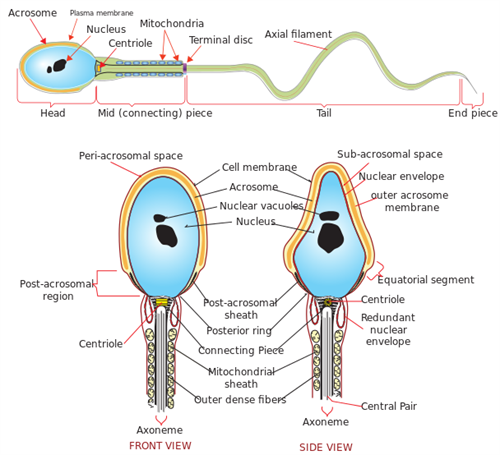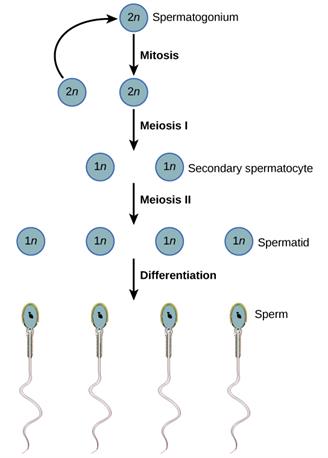PDF chapter test TRY NOW
In this theory, we shall study the pre-fertilization events, gametogenesis and gamete transfer.
Gametogenesis:
Gametogenesis is the process of the formation of gametes or sex cells, i.e., sperm in males and ovum in females.
Spermatogenesis:
The sperms are produced in the seminiferous tubule present in the testis (male reproductive organ). The process is called spermatogenesis.
First, let us study the structure of the sperm or spermatozoa. Each sperm is a cell of length 50m. The spermatozoa consist of:
1. Head
2. Middle piece
3. Tail

Structure of a sperm
The head of the sperm is elongated and is formed by the condensation of the nucleus. The anterior portion of the sperm contains a protective cap-like structure called an acrosome at the tip. The acrosome secretes hyaluronidase, a lytic enzyme that helps break down the wall of the egg for fertilization. It helps the sperm to enter the ovum during the process of fertilization.
A short neck connects the middle piece and the head. It comprises centrioles. The middle piece contains mitochondria that provide energy for the tail's movement. It brings about sperm motility essential for fertilization.
The sperm has a long tail. It helps the sperm in swimming inside the female reproductive tract. This facilitates the sperm to reach the egg.
A video displaying the parts of a sperm:
The sperm is produced from its precursor, the spermatogonium. Spermatogonium first divides mitotically to produce the diploid spermatocytes.
Spermatocytes undergo meiosis to produce four haploid spermatids that are immature sperms. The spermatids undergo maturation and differentiation in the epididymis to develop into sperm.

Process of spermatogenesis
Reference:
https://commons.wikimedia.org/wiki/File:Complete_diagram_of_a_human_spermatozoa_en.svg
https://www.youtube.com/watch?v=sOVpgmxBiqY&t=8s
https://upload.wikimedia.org/wikipedia/commons/f/f1/Figure_43_03_05.jpg
